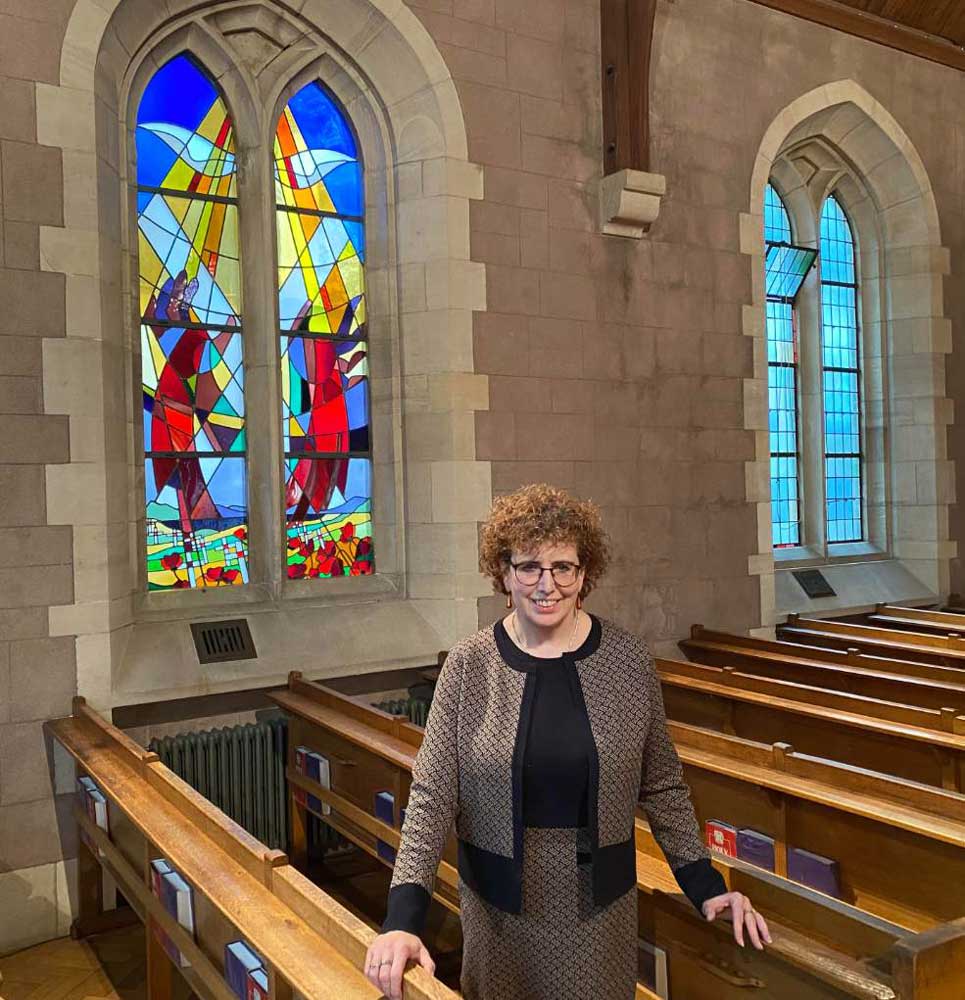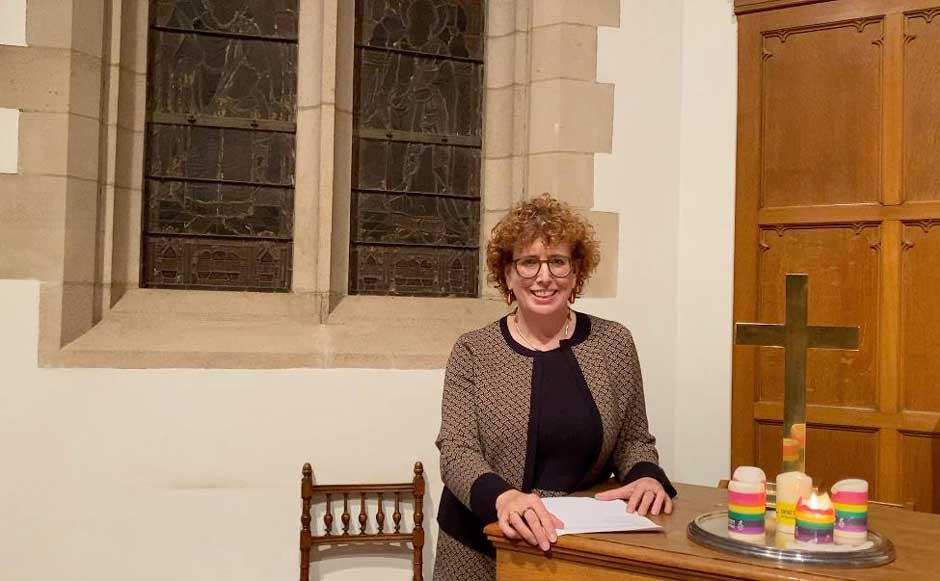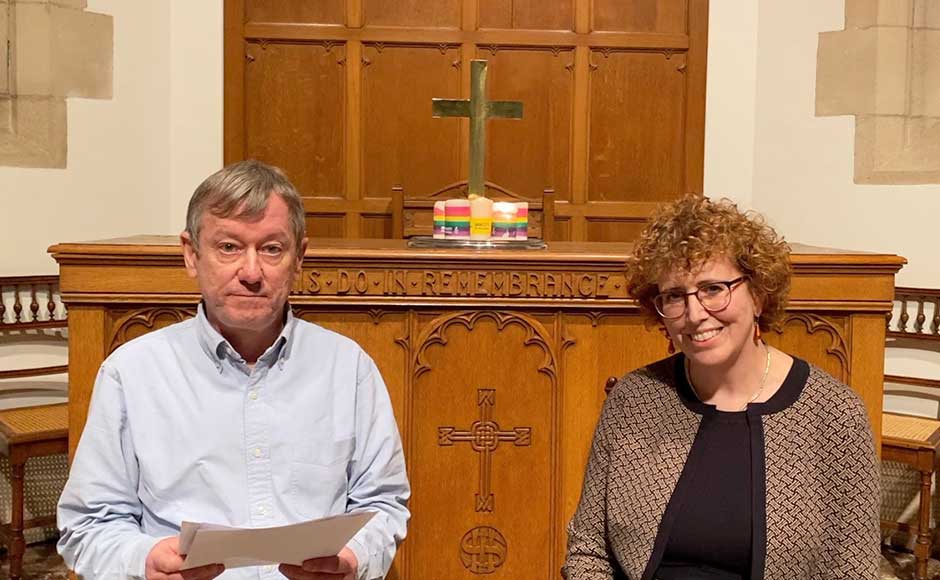December 2022: Reader-in-Training Sia Van den Bremt

The Church of Scotland's ‘Talking Ministry' series shares personal stories from those serving in Christian ministry, along with resources filled with questions, prayers and reflections to help encourage reflection on how God might be calling you at this time.
For December, Sia Van den Bremt speaks about her role as Reader-in-training at St Andrew's Church in Brussels, and we explore the theme: Are we listening?
My ministry: Sia Van den Bremt, Reader in training at St Andrew's Church, Brussels
Resident in Brussels since 1986, Sia Van den Bremt's family connections with Belgium date back to the First World War, when her Belgian grandmother met her future husband, Sia's grandfather, one of the millions of British servicemen posted to the Western Front. Sia works for an international agricultural company and she and her Belgian-born husband have two children who are now in their early twenties.
She is currently three-quarters of the way through her training to become a Reader in the Church of Scotland, allowing her to conduct worship, preach and offer pastoral care, and stand in for absent or ill ministers within her own or other presbyteries.
Was there a particular moment when you decided to become a Christian or has your faith always been an important part of your life?
I was actually born in Sierra Leone where my parents were Methodist missionaries, so that's where my name comes from - in the region where I was born, the first daughter was traditionally called Sia.
There did come a point when I was 14 when I decided I wanted to make the statement of faith for myself, so I didn't just carry on doing what my mum did, and wanted to be confirmed.
My family are Methodists. My great-grandfather was a Methodist evangelist, my grandad was a Methodist minister, my mum and dad were both lay preachers and my cousins have also preached. But despite this, most of my formative years were spent in an ecumenical environment. We moved to a new town after my dad died. When the town was built, they decided that instead of building five churches they would just build one.
We had Congregationalist, Presbyterian, Methodist, Baptist and Anglican all sharing the same building, so I was brought up with very little idea of the difference between all of these denominations. It also meant that when I came to Brussels I didn't really know which church I was going to go to, but on the map, just down the road from where I was living, was something called "Eglise Ecossaise", so I went along and I fitted in and I've been there more or less ever since.
Like anybody, I suppose there have been ups and downs in faith, but for the most part I have always found a home in the church wherever I have been – when I was at university, when I had a year abroad in France, when I moved to Brussels. That's the wonderful thing, being able to go to a church anywhere and find people who are of a like mind.
What attracted you to the role of Reader in the Church of Scotland?
I think that was because of my family background with all of these people who were preachers!
I always thought that I should preach some time, but I held off because I thought that if I wanted to be sure that God wanted me to do it, then I had to wait until somebody asked me.
That did eventually happen, but I did lots of other things before then, like Sunday School and Bible class and some short meditations and I am an elder in the Church of Scotland, so I already do some pastoral care when I have time.
I had lunch with our auxiliary minister and told her about my family and how I always thought about preaching, so she passed my name on to our minister at the time and I ended up doing a service, so that was the start of it.
What have been your highlights as a Reader in training and what have you learned from the role?

I love the preaching aspect of being a Reader, but I also love the preparation. I feel that's when I have a dialogue with God and that's when I feel closest to God and that's wonderful.
I get nervous when I stand up to preach, but I firmly believe that if someone needs to hear a message, God will pass it on through me, however clumsy my words are or how inarticulate I am. I sort of feel I need to send it upstairs and say: "Do what you need to do today, God!"
I also had a placement in a Belgian church, which was actually the Belgian church I attended in the 1990s for a while, and it was a good opportunity to renew my contacts with that congregation. I was mainly involved with Sunday School, and it was great to be able to work with the children and the youth leaders.
I have to complete four semesters of training to qualify as a Reader. I am now in my third semester and I have been learning a lot. The tutorials have given me the opportunity to hear from the rest of the class and benefit from their experience and knowledge.
You are part of the Church of Scotland's International Presbytery and based in Brussels, so what is the Church of Scotland community like there?
The Church of Scotland in Brussels is a very friendly church. In the time I've been there, it has become very mixed with members from Africa, the Philippines and Eastern Europe.
Our church is building up again after Covid, when our services had to go online for a year-and-a-half. People are now coming back to church, which is great, but we are still putting our services online, which has been wonderful too because it means the services can be watched by former members who have gone home, or people worldwide with no connection to the church. We've had people in California and South America writing to us to say how much they have been enjoying the services, which is wonderful to hear.
Is there anyone you look up to as an example of Christian service?
My mother was a local lay preacher for about 65 years, so she has been a good example for me, along with the other members of the family I heard about who went before me.

My grandad was a Methodist minister in the North of England in the 1930s and we moved back to that area in 1969 when my dad died. There were people who spoke to my mum who remembered my grandad's sermons. I think that is incredible, to have touched somebody in such a way that they remember 30 years later. I don't know if I can aspire to that, but that would be the ultimate, to have someone remember something you said 30-odd years later.
To be able to have that effect and bring God to someone that they remember it so well after such a long time, that is an amazing privilege.
We also had a very inspiring Bible group in the 1990s. Most of the members have now moved on but I learnt a lot from them and we've stayed in contact.
There are also various ministers who have supported me. Our current minister, Rev Eric Foggitt, has really encouraged those who have put their toes in the water by preaching during the vacancy to build on that experience and carry on. That encouragement and mentoring from Eric has been really valuable.
What is the best piece of advice you have been given and what advice would you give to someone who wants to serve in ministry?
The best piece of advice probably came from one of my tutors, Ken Jeffries, who was leading the preaching course. He said that you have to learn to love your congregation and love the people you are talking to so that you can get your message across and I thought that was a great piece of advice.
What advice would I give? Firstly, I would say to make the most of the discernment period. It gives you a chance to put your toe in the water, but if you don't feel it's right, you can step back. It gives you a chance to consider what you are doing and I think that is important.
I've also noticed that quite a few people have started as Reader and then gone on to train as Ordained Local Ministers instead. There are various options within the Church of Scotland and you really need to consider which option is best for you and try and understand what God is calling you to do.
And I would also say that the studies are a shock to the system – but they are worth it.
December Discernment Resources: Are we listening?
If you're reading this, maybe you've already felt that God might be calling you into some kind of service in the church and you're looking further. If so, you're already listening – but what is God actually asking? Sometimes that call can be a bit hard to fathom, and sometimes it's not what you had in mind in the plan for your life! Call can be such an imprecise and unpredictable thing. On the other hand, maybe you have a very definite sense of call, but have you considered all the options? Are you still listening? It's possible that in your certainty, you've closed down other possibilities.
Mary, the mother of Jesus was likely on course for a good, but not particularly noteworthy life, until she received an angelic visitor who foretold her destiny to bear God's son:
38 Then Mary said, "Here am I, the servant of the Lord; let it be with me according to your word." Then the angel departed from her. 39 In those days Mary set out and went with haste to a Judean town in the hill country, 40 where she entered the house of Zechariah and greeted Elizabeth.
Luke 1: 38-40
I doubt that she was just as serene as that in her response. I imagine her running to her cousin Elizabeth's home and bursting through the door and pouring her heart out. "What am I going to do with this situation that will totally change my life?"
I shall be telling this with a sigh
Sometimes ages and ages hence
Two roads diverged in a wood, and I –
I took the one less travelled by,
And that has made all the difference.Robert Frost
Exploring vocation does that to you. It turns you upside down and inside out, and it's hard to do on your own. So be brave enough to share your exploration with others. Bring it before God in prayer, and take the time to see what others who know you well in your church community think. I bet that Elizabeth took Mary in her arms and told her to calm down, then did the equivalent of putting the kettle on for a cuppa to help them talk it all over. Mary's song, the Magnificat, is an affirmation that God does incredible things through unlikely people. Those who thought that they were of no particular consequence turn out to have rich gifts to share. From a poor young woman, to weary fishermen on the shore, the call goes out to those with a heart and mind open to taking the risk of walking off the beaten track of life.
To contemplate/discuss
What could it be that God sees in you? Take some time to pray this out.
Have you taken the time to chat to others about your sense of call?
What do others say about your gifts?
What if you're called off the beaten track? Will you be open to the invitation?
What will you say in response?
"God is looking for those with whom He can do the impossible — what a pity that we plan only the things that we can do by ourselves."
AW Tozer
Prayer
Lord, your summons echoes true
when you but call my name.
Let me turn and follow you
and never be the same.
In your company I'll go
where your love and footsteps show.
Thus I'll move and live and grow
in you and you in me.John L. Bell and Graham Maule
God, you can work through my life in incredible ways. May my heart be tuned to your heart, so that I can discern what you are calling me to. Give me the courage to risk sharing what I hear, and to live out that call as it comes. Amen
More information
If you would like to consider how God might be calling you to serve at this time, you may want to discuss further with your minister or be in touch with your Presbytery to explore local opportunities.
If you are interested in exploring a call to the recognised ministries of the Church, you can find more information on our vocations page and can contact ministry@churchofscotland.org.uk for a Discernment Conversation with one of the Recruitment Team.